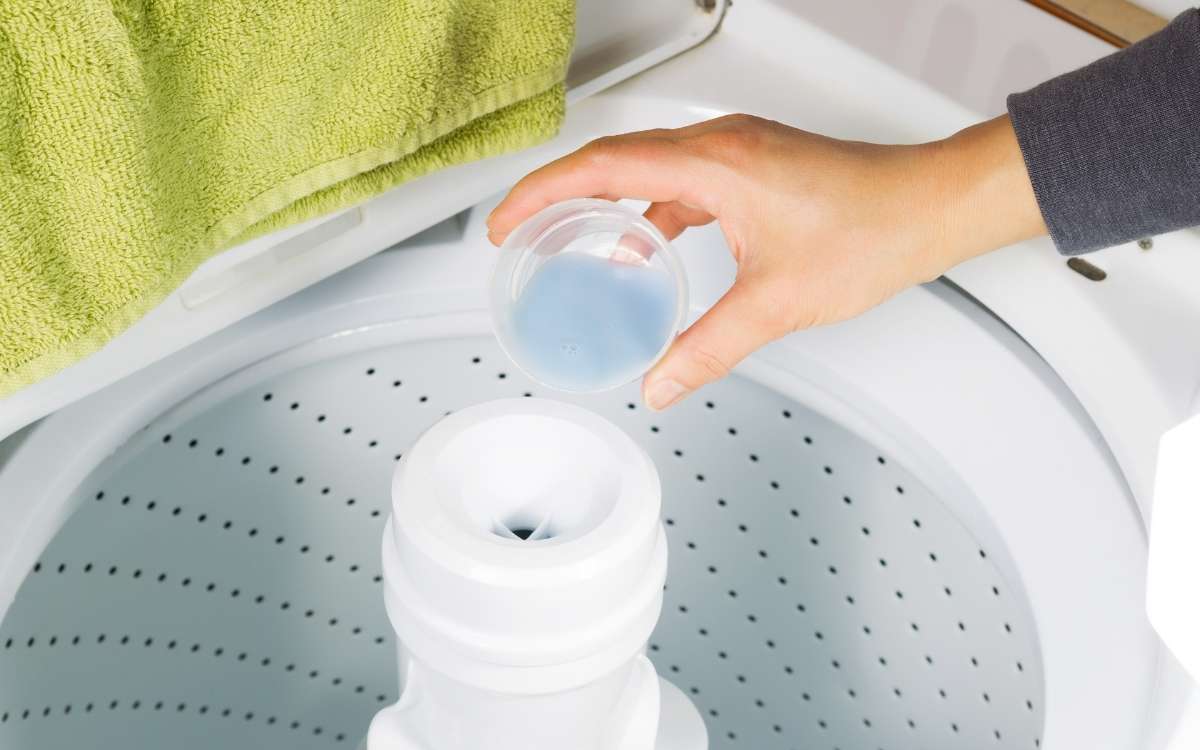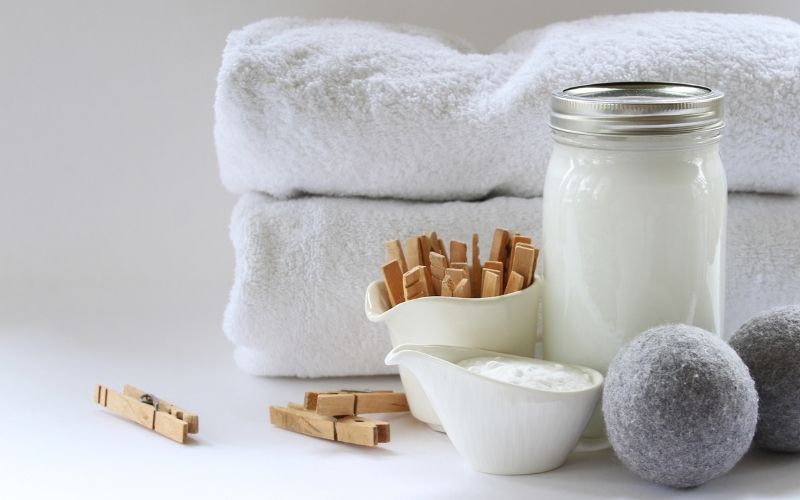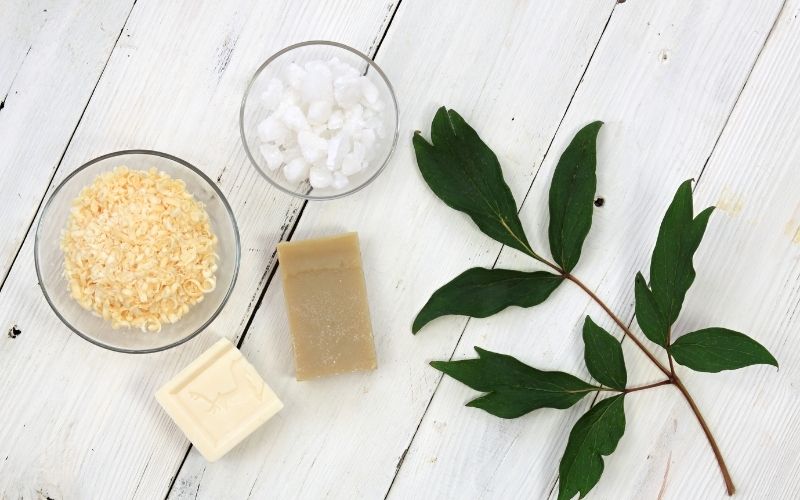It’s been all the rage to substitute household cleaners and explore different ways to save money and be more sustainable. But, what about dish soap in the laundry? Can you really use it as a detergent?
Technically, it can be used, but dish soap is not meant for clothes and can lead to problems. Try to avoid using it. If you’re out of laundry detergent or in a bind, it can work on occasion in a pinch. Just make sure to use a very small amount, about half a teaspoon per load.

Read on to learn more about why dish soap is not a good idea for laundry and what some better alternatives are.
Can I Use Dawn Dish Soap for Laundry?
Dish soap is designed to break up grease and oil on dishes, which sounds like it would be helpful in the laundry too.
However, dish soap can actually leave a film on clothing that causes fabrics to become stiff, dull, and less absorbent. In addition, dish soap is not very effective at removing mud or dirt from clothing.
Some people recommend using a small amount of dish soap in the laundry as a pre-treatment for stains. However, this can actually make some stains more difficult to remove and may damage your washing machine.
It’s best to avoid using dish soap in the laundry and to find a more suitable alternative.
Consequences of Using Dish Soap in the Laundry
So, what happens if you use dish soap in the laundry? Can it really damage your clothes or washing machine?
It Creates a Lot of Suds
One of the consequences of using dish soap in the laundry is that it creates a lot of suds. This can be problematic because too many suds can cause your washing machine to become unbalanced and stop working properly.
In addition, suds can lead to clothes not being as clean as they should be because they prevent water and detergent from penetrating the fabric.
It Doesn’t Fully Clean Your Clothes
Dish soap is not designed for laundry and does not clean clothes as well as laundry detergent. Dish soap can actually leave a film on clothing that causes fabrics to become stiff, dull, and less absorbent.
In addition, dish soap is not very effective at removing mud or dirt from clothing.
It Can Affect the Quality of Your Clothing
Dish soap is harsh and can strip away the natural oils in fabrics, which can lead to static cling, stiffness, and fading. In addition, dish soap is not designed for high-temperature washing and can contribute to clothes shrinking.
It Can Damage Your Washing Machine
Using dish soap in the laundry can also damage your washing machine. It can cause the seals on the machine to break down, leading to water leakage.
In addition, the foaming soap can cause a problem with the machine’s drainage system, which can lead to a build-up of suds and lead to water leakage.
Laundry Detergent Vs. Dish Soap

You may be wondering why dish soap doesn’t work the same way as laundry detergent. Laundry detergent is designed specifically for laundry and contains ingredients that are gentle on fabrics and effective at removing stains.
Dish soap is designed for dishes and contains harsh chemicals that can strip away the natural oils in fabrics, which can lead to static cling, stiffness, and fading.
There are also additives in dish soap for your hands, which won’t work as well on fabrics. In addition, dish soap is not designed for high-temperature washing and can contribute to clothes shrinking.
So, while you can technically use dish soap in the laundry, it’s not a good idea. It’s best to find a more suitable alternative, such as laundry detergent.
Ultimately, their properties are suited for different materials. Fabrics are vastly different from non-porous plate ware and cookware. Furthermore, there are many different types of fabrics- each with its own specific cleaning needs.
What Can Be Used as a Substitute for Laundry Detergent?

If you’re looking for an environmentally-friendly, affordable, and effective detergent for your laundry needs, there are several options to consider. Some good alternatives include:
Borax: Borax is a natural mineral that can be used as a laundry detergent booster or as a standalone detergent. It is effective at removing stains and dirt, and it is affordable and easy to find. Make sure not to ingest any borax, as it can be toxic.
Fabuloso: Fabuloso works best with sturdier fabrics (cotton and denim etc) that are heavily soiled. It’s low foam, pH neutral solution will sanitize your clothes without damaging them. It’s important that you make sure your fabrics aren’t too delicate for this cleaner, so don’t use it on things like silk or wool.
Washing Soda: Washing soda is also a natural mineral that is commonly and historically used as an alternative laundry detergent. It is effective at removing stains and dirt, and it is affordable and easy to find. Like borax, make sure not to ingest any washing soda, as it can be toxic.
Soap Nuts: Soap nuts are a natural and environmentally-friendly alternative to laundry detergent. You use them by boiling them in water, and the boiling water releases saponins, which are natural surfactants.
Soap nuts are effective at removing stains and dirt, and they are affordable and easy to find. You can find soap nuts online or at health food stores.
Baking Soda: Baking soda is another natural substance that can be used as a laundry detergent. It is effective at removing stains and odors, and it is also affordable and easy to find. It’s also great for brightening whites.
White Vinegar: White vinegar can be used as a fabric softener or for pre-treating stains. It is also effective at removing odors. Don’t worry about that pungent smell. With an extra rinse cycle, the vinegar smell will dissipate.
Dr. Broner’s Soap: Dr. Bronner’s soap is a natural, environmentally-friendly soap that can be used as a laundry detergent. It is effective at removing stains and dirt, and it is gentle on fabrics. You can mix a half cup of castile soap with half a cup of vinegar for a great DIY detergent.
Add Essential Oils or Lemon: consider adding essential oils or lemon to these laundry soap alternatives. Essential oils can be found at most health food stores, and in addition to adding a fresh scent to your laundry, many of them also have anti-microbial properties.
Final Thoughts
As tempting as it may be to use dish soap the next time you run out of detergent, it’s not a good idea. While it may seem useful at that moment, it could have long-lasting consequences for your clothes and washing machine.
There are many affordable, effective, and environmentally-friendly laundry detergent alternatives available that will get the job done without putting your clothes at risk.
Related:
